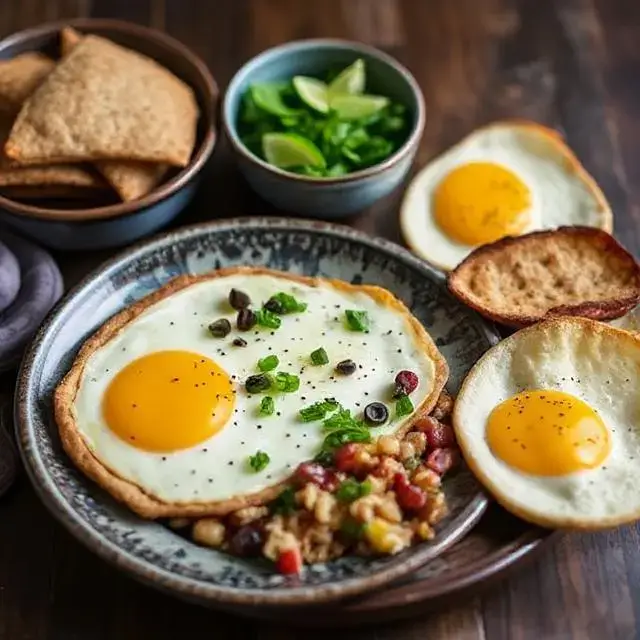Traditional Arabic Breakfast Food Recipes to Try at Home
Table of Contents

Growing up in a multicultural neighborhood was special. My neighbor would share her Middle Eastern breakfast treats on weekends. The colors, smells, and tastes of Arabic Breakfast Food Recipes took me far from my kitchen.
Explore the world of Middle Eastern breakfast dishes. They will change your mornings. Arabic breakfasts are more than food; they’re cultural experiences. They mix old traditions with healthy ingredients and amazing flavors.
Try the sweet Balaleet from the UAE or the hearty Fuul Medames from Egypt. These dishes offer something for everyone. Each one shares stories of tradition, family, and the joy of starting the day right.
Key Takeaways
- Discover diverse and flavorful Middle Eastern breakfast dishes
- Explore traditional recipes with rich cultural significance
- Learn about nutritious ingredients used in Arabic cuisine
- Experience a culinary journey through regional breakfast traditions
- Understand the health benefits of traditional Arabic morning meals
Introduction to Middle Eastern Morning Cuisine
Traditional arab morning meals are more than just food. They are a journey through culture and nutrition. Families in the Middle East come together to share meals that connect them to their heritage and give them energy for the day.
The morning meal in Middle Eastern cultures is a celebration of community and tradition. Let’s dive into the world of Arabic breakfast traditions.
Historical Significance of Arabic Breakfast
Arabic breakfast has deep roots in the region’s culture. It has been important since ancient times. The traditional morning spread tells stories of survival, agriculture, and shared experiences.
- Bread has been a staple for thousands of years
- Dips like hummus represent cultural exchange
- Regional ingredients showcase local agricultural practices
Cultural Importance of Morning Meals
In Middle Eastern cultures, breakfast is a time for families to come together. It’s a chance for connection, conversation, and sharing. Each region adds its own flavors and traditions to the table.
| Region | Signature Breakfast Dish | Key Ingredients |
|---|---|---|
| Levant | Foul Medames | Fava beans, olive oil, garlic |
| Egypt | Ful Medames with Toppings | Fava beans, onions, tomatoes |
| Morocco | Msemmen | Layered flatbread, butter, honey |
Health Benefits of Traditional Arabic Breakfast
The traditional arab morning meals are very nutritious. They include whole grains, fresh vegetables, and olive oil. These ingredients provide important nutrients for health.
- Protein-rich dishes like ful medames support muscle health
- Probiotic-rich labneh supports digestive wellness
- Fresh vegetables provide essential vitamins and minerals
By following these traditional breakfast practices, you’re not just eating. You’re joining a centuries-old tradition that nourishes both body and soul.
Essential Ingredients for Arabic Breakfast Food Recipes
Exploring levantine breakfast fare means knowing the key ingredients. These ingredients make traditional morning meals come alive. Your journey through Arabic breakfast delicacies starts with a pantry full of vibrant, flavorful staples.
Essential ingredients for authentic emirati breakfast delicacies include:
- Za’atar: A aromatic herb blend of dried thyme, sumac, and sesame seeds
- Labneh: Creamy strained yogurt with a tangy flavor
- Olive oil: A fundamental cooking and finishing ingredient
- Fava beans: A protein-rich staple in many Levantine recipes
- Tahini: Nutty sesame seed paste used in various dishes
Regional variations are key in breakfast ingredient choices. Levantine cuisine often highlights herb flavors. But emirati breakfasts feature richer, more robust spices and ingredients.
Your breakfast pantry should have these versatile items:
- Fresh herbs like parsley and mint
- Spices such as cumin and paprika
- Whole grains and flatbreads
- Fresh cheeses and yogurts
- Seasonal vegetables and fruits
Knowing these ingredients helps you make authentic, delicious Arabic breakfast dishes. They take your taste buds straight to the Middle East.
Traditional Shakshuka: A North African Breakfast Staple
Shakshuka is a vibrant dish from North Africa that has won the hearts of many. It’s a halal breakfast option that turns simple ingredients into a masterpiece.
From Tunisia, shakshuka is more than a meal. It’s a cultural experience that brings people together. It combines rich flavors and nutritious ingredients in one skillet, ideal for those who love Middle Eastern cuisine.
Preparing the Perfect Tomato Base
To make great shakshuka, start with a strong tomato sauce. You’ll need:
- 1 medium yellow onion, diced
- 1 medium bell pepper, chopped
- 2 cloves garlic, minced
- 2 tablespoons olive oil
- 2 tablespoons tomato paste
Egg Poaching Techniques
Mastering egg poaching is key for real shakshuka. Gently create wells in the tomato sauce and crack eggs into them. Cover and cook for 6-8 minutes for soft yolks.
Seasoning and Spice Combinations
Add flavor with traditional spices:
- 1 teaspoon ground cumin
- 1 teaspoon paprika
- 1/2 teaspoon cayenne pepper (optional)
- Fresh cilantro or parsley for garnish
This dish serves 4-6 people and is great for any meal. Enjoy it with warm pita bread or crusty sourdough for a complete experience.
Popular Mediterranean Breakfast Breads
Discover the rich world of Mediterranean breakfast cuisine through its delightful breads. These traditional breads are more than just a side dish. They offer a culinary experience that connects you to centuries of cultural tradition.
Two standout breads in the Mediterranean breakfast repertoire are manakesh and tameez. Each has unique characteristics and preparation methods:
- Manakesh: A Lebanese favorite that turns breakfast into a flavor-packed adventure
- Tameez: A Saudi Arabian bread with deep cultural roots
Manakesh is a standout in Levantine breakfast fare. It’s versatile and includes:
| Ingredient | Quantity |
|---|---|
| Water | 1 1/4 cup |
| Active Dry Yeast | 1 1/2 tsp |
| Bread Flour | 2 1/2 cups |
| Cake Flour | 1 cup |
Popular toppings make manakesh a breakfast superstar. You can enjoy it with:
- Za’atar mixture
- Mozzarella cheese
- Nabulsi cheese
“Bread is the heart of Mediterranean breakfast – it tells a story of tradition and comfort.” – Mediterranean Food Expert
Tameez offers another fascinating bread experience. Its recipe includes whole wheat flour and can be enhanced with optional cheese filling. Traditionally baked in a Tandoor oven, it has a crispy exterior that makes it irresistible in Mediterranean breakfast cuisine.
Authentic Arabic Breakfast Food Recipes
Discover the rich flavors of traditional arab morning meals through these delightful arabic breakfast food recipes. They will transform your morning routine. Arabic cuisine offers a diverse range of breakfast options that are both nutritious and delicious.
Explore these mouthwatering recipes that capture the essence of Middle Eastern morning cuisine:
Classic Recipe: Shakshuka
Shakshuka is a quintessential arabic breakfast food recipe. It’s both versatile and satisfying. This traditional dish features eggs poached in a spicy tomato sauce, packed with incredible flavor and nutrition.
- High in protein (over 25 grams per serving)
- Preparation time: Approximately 15 minutes
- Served with warm pita or flatbread
- Adaptable to various dietary preferences
Regional Variations
Different Arab countries offer unique twists on classic recipes. From the firmness of eggs to the thickness of sauces, each region brings its own special touch to traditional arab morning meals.
Modern Interpretations
Contemporary chefs are reimagining classic dishes with innovative approaches. You can customize recipes to suit gluten-free, vegetarian, or low-carb diets while maintaining authentic flavors.
Serving Suggestions
Elevate your breakfast experience by pairing these dishes with:
- Labneh drizzled with olive oil
- Fresh herbs like parsley and mint
- Za’atar-seasoned flatbread
- Authentic Middle Eastern spices
Each recipe tells a story of cultural heritage. It brings the warmth of Arab kitchens directly to your breakfast table.
Essential Kitchen Tools and Equipment
To make authentic emirati breakfast dishes, you need special kitchen tools. These tools help you cook traditional Middle Eastern breakfasts with ease. Your kitchen should have key pieces that make cooking fun and efficient.

Here are the must-have tools for making amazing middle eastern breakfast dishes:
- Cast Iron Skillet (Lodge Cast Iron): Great for even heat and crispy edges on breads and eggs
- Induction Cooktop Burner (Duxtop 1800W): Offers precise heat for delicate cooking
- Bamboo Wooden Spatula for gentle handling of ingredients
- Wide frying pan with lid for shakshuka and egg dishes
- Stand mixer with dough hook for fresh breads
For exploring emirati breakfast delicacies, you’ll need special baking tools. Think about getting:
- Pizza stone for crispy flatbreads
- Baking sheet for various cooking methods
- Spray bottle for steam during baking
Choosing top-notch kitchen tools makes your middle eastern breakfast dishes stand out. Each tool is vital for bringing out the true flavors and textures of Arabic morning cuisine.
Time-Saving Breakfast Preparation Tips
Creating tasty gulf breakfast specialties doesn’t have to take up your whole morning. With some planning and smart prep, you can enjoy halal breakfasts without spending hours cooking.
Start by figuring out what can be made ahead of time. Using smart cooking methods can change your morning. It helps you serve tasty Arabic breakfasts fast.
Make-Ahead Components
- Prepare foul medames in large batches and refrigerate
- Use store-bought pita bread to reduce preparation time
- Pre-chop fresh herbs and vegetables for quick assembly
- Cook protein components like eggs in advance
Storage Guidelines
Keeping your breakfasts fresh is key. Store ingredients in airtight containers in the fridge. Most halal breakfasts stay good for 3-4 days.
Reheating Methods
- Use low heat to warm dishes gradually
- Add a splash of water when reheating to prevent dryness
- Avoid microwave when possible – use stovetop or oven
- Refresh dishes with fresh herbs or a drizzle of olive oil
With these tips, you can enjoy real Arabic breakfasts without losing flavor. And you won’t have to spend hours cooking.
Vegetarian and Vegan Arabic Breakfast Options

Looking for ramadan breakfast ideas doesn’t mean you have to give up taste or nutrition. Mediterranean breakfast cuisine has many tasty, plant-based options. They are not only delicious but also packed with nutrients.
The Vegan Eggs and Potatoes (Bayd w Batata/Mfarakeh) is a standout. It uses chickpea flour, plant-based milk, and spices. This makes a protein-rich breakfast that’s also gluten-free and soy-free.
- High in protein and essential minerals
- Gluten-free and soy-free
- Customizable with additional vegetables
- Easy to prepare and store
The Vegan Freekeh with Roasted Cauliflower and Chickpeas is another great choice. It combines traditional Arabic ingredients with modern vegan cooking:
- Cracked green freekeh as the base
- Roasted cauliflower and chickpeas for protein
- Seasoned with sumac and cumin
- Optional pomegranate seeds for extra flavor
These vegetarian breakfast ideas are great for suhoor during Ramadan. They offer lasting energy and show how Mediterranean cuisine can be both healthy and tasty.
Pro tip: Experiment with local vegetables and spices to create your unique twist on these traditional recipes!
Pairing and Serving Suggestions for Arabic Morning Meals
Making the perfect Arabic breakfast is more than just cooking tasty dishes. It’s about pairing, presenting, and understanding the culture. This turns a simple meal into a memorable experience.
Traditional Beverage Accompaniments
Arabic breakfast comes alive with its special drinks. Your morning isn’t complete without these:
- Arabic coffee (Qahwa) – served in small delicate cups
- Mint tea – refreshing and palate-cleansing
- Karak chai – a rich, spiced tea with milk
Side Dish Recommendations
Enhance your Arabic breakfast with these side dishes. They add texture and flavor:
- Fresh chopped vegetable salads
- Pickled vegetables
- Warm pita bread
- Creamy labneh
Presentation Tips
Make your Arabic breakfast a feast for the eyes with these tips:
- Use colorful ceramic plates
- Garnish with fresh herbs
- Arrange dishes family-style
- Include wooden serving boards
A great Arabic breakfast is about sharing, connecting, and celebrating culinary traditions.
Conclusion
Your journey through Middle Eastern breakfast dishes has shown you a world of flavors and traditions. Arabic breakfast recipes are more than just food. They connect you to centuries of culinary history. From Balaleet to Shakshuka, these dishes make breakfast an exciting adventure.
Trying out these Middle Eastern dishes brings diversity and fun to your mornings. These recipes are about more than just eating. They’re about making connections and sharing stories through food. Each dish brings a piece of regional traditions and family gatherings to your table.
By trying these recipes, you open up to a world of culinary creativity. You can mix traditional methods with your own ideas. Whether you’re an experienced cook or just starting, Arabic breakfast recipes are a great way to explore a rich food culture.
Don’t stop exploring Middle Eastern cuisine. Keep trying new ingredients and techniques. Let every meal be a chance to connect with a tradition that celebrates flavor, nutrition, and sharing meals.
Share Your Creation!
I’d love to see how your Arabic Breakfast Food Recipes turns out! If you make this recipe, please leave a comment and rating below. You can also share your creation by tagging me on pinterest @bake_iteasy with the hashtag #Arabic Breakfast Food Recipes .
FAQ
What makes Arabic breakfast cuisine unique?
Are Arabic breakfast dishes healthy?
Can vegetarians and vegans enjoy Arabic breakfast foods?
What are some must-have ingredients for Arabic breakfast cooking?
How can I prepare Arabic breakfast dishes quickly?
What traditional beverages pair well with Arabic breakfast?
Are there regional variations in Arabic breakfast cuisine?
How can I create an authentic Arabic breakfast spread at home?
Did you try our recipe ?
There are no reviews yet. Be the first one to write one.







